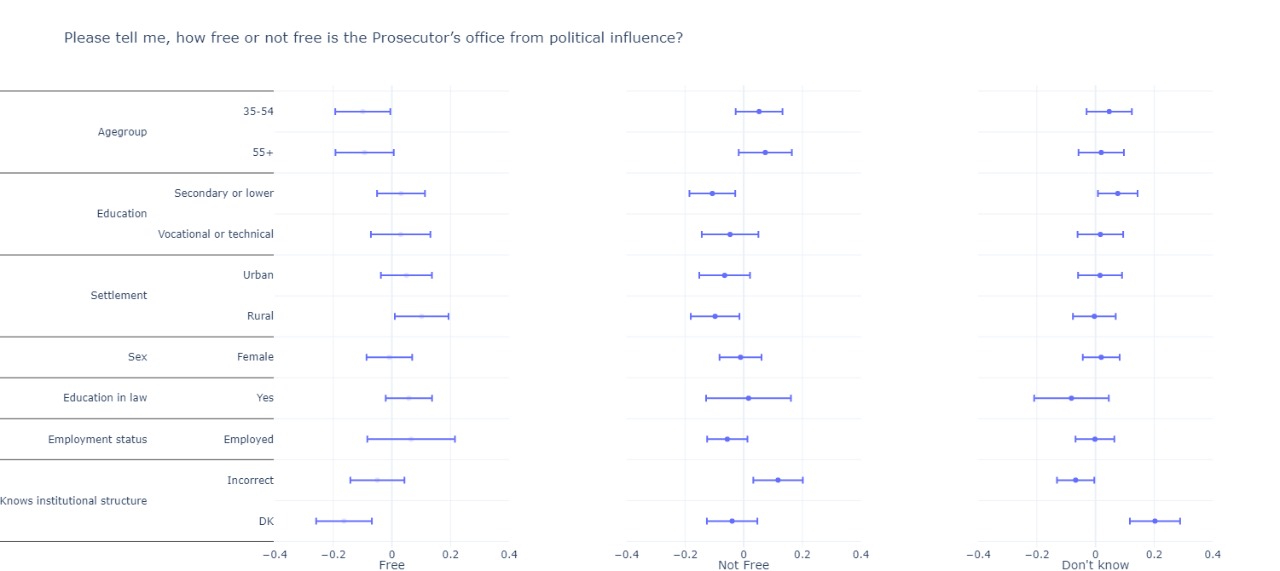The Georgian public has been in a near-perpetual state of shock in recent years over a stream of high-profile criminal cases. In many of these, the impartiality and effectiveness of the Prosecutor’s Office has come into question, but what do people really think about this vital institution?
Cases like the Khorava Street Murders, the killing by the Security Services of Temirlan Machalikashvili, and most recently, the murder of 19-year-old Giorgi Shakarashvili have captured the public attention.
More recently, there has been widespread discussion over the death of Tamar Bachaleishvili. The authorities suggest she took her own life while the opposition and some in the media have argued that foul play was involved.
The media has widely covered these cases, often questioning the effectiveness of the Prosecutor’s Office.
Between 30 March and 12 April, CRRC Georgia conducted a study on people’s knowledge of and attitudes towards the Prosecutor’s Office within the PRIME project.
Data from the study suggests that people tend towards thinking there is political interference in the Prosecutors Office. Yet, they are often unaware of some basic facts about the institution.
The survey data indicates that while few think the Prosecutor’s Office is fully under the thumb of political forces, few think it is entirely free either.
Only 6% of the public said they thought the Prosecutor’s Office was completely free of political influence. By comparison, 11% thought it was not free at all. The remainder of the public said it was mainly free (39%), mainly unfree (21%) or that they were uncertain if it was under political influence (22%).
Analyses of the above question suggest that age, level of education, and settlement type are related to people’s opinions of how free on unfree the Prosecutor’s Office is from political influence.
People between the ages of 35–54 were more likely to report that the Prosecutor’s Office was free from political influences compared to younger people. Those with secondary or lower education were more likely to report that the Prosecutor’s Office was not free from political influence compared to people with higher education.
When it comes to settlement type, people living in rural areas were more likely to report that the Prosecutor’s Office was free from political influences than people in Tbilisi.
In December 2018, the Prosecutor’s Office was separated from the Ministry of Justice and became a fully independent agency. The study checked whether people knew where the Prosecutor’s Office was institutionally located and asked respondents which of the following statements was true:
- The Prosecutor’s Office of Georgia is currently subordinated to the Ministry of Justice;
- The Prosecutor’s Office of Georgia is currently subordinated to the Ministry of Internal Affairs;
- The Prosecutor’s Office of Georgia is currently an independent structure.
The data shows that approximately a third of people (34%) did not know, and a third of people believe that the Prosecutor’s office was subordinated to the Ministry of Justice or Ministry of Internal Affairs. People were also largely unaware of who the Prosecutor General is.
[Read more: Controversial Georgian ex-Chief Prosecutor reconfirmed to his post]
The majority (64%) in Georgia did not know who the Prosecutor General is, and 2% reported someone aside from who the actual Prosecutor General is.
A regression shows that people who do not know which of the above statements about the Prosecutor’s Office was true were more likely to report that it was free from political influences. They were also more likely to report that they didn’t know the answer to the question.

The public’s opinion is a mixed bag about the Prosecutor’s Office. The majority have no idea who the Prosecutor General is or whether the Prosecutor’s Office is independent or a subordinated structure.
Most people believe that the Prosecutor’s Office is subject to political influence, though there is some variation between social and demographic groups.
The views presented in this article do not represent the views of CRRC Georgia or any related entity.









